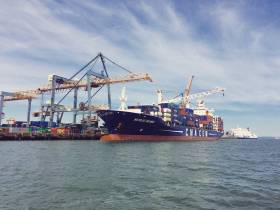Displaying items by tag: Smart Ports
Atlantic Smart Ports Blue Acceleration Network Boosting Start-Ups With Workshops & Mentorship Programme
The Atlantic Smart Ports Blue Acceleration Network’s (AspBAN) programme for startups aims to develop innovative solutions to the needs, challenges and innovation priorities of the ports of the Atlantic.
Elisa Ferreira, European Commissioner for Cohesion and Reforms, highlighted the role of the project — which is co-financed by the European Union under the European Maritime Fund and Fisheries — for its contribution to the implementation of the Action Plan for the Atlantic 2.0.
AspBAN’s Acceleration Services programme will consist of weekly workshops on topics related to product-market fit, collaborating within the blue economy, metrics, implementing and scaling and so on. These will be complemented by mentoring sessions with experts.
Every two months a pitch session will be hosted, where start-ups will be pitching to investors, ports and other relevant stakeholders in the ever-growing AspBAN network.
The programme is focused on strengthening innovation in the European blue economy, with a clear focus on sustainability. Therefore, it will be open for start-ups that are both able and willing to implement their sustainable solutions in AspBAN’s focus countries: Portugal, Spain, France and Ireland.
Also, start-ups should have at least a prototype ready and be prepared to raise money.
“The Acceleration Services programme is a deep dive into the European Innovation ecosystem of Atlantic blue ports,” says Ana Pinela, project coordinator for Beta-i Collaborative Innovation.
“It will involve sharing specific knowledge while connecting the participating start-ups to relevant investors, like-minded people and mentors to accelerate their businesses. Also, it will allow start-ups to connect with other start-ups, scale-ups and SMEs in a universe of Atlantic blue ports.
“We’re searching for innovative start-ups, whose cutting-edge solutions may contribute to boosting digitalisation and improve operational efficiency, green transition and positive impact on achieving sustainability metrics, and for the emergence of new businesses for the ports in the blue economy area.
“AspBAN aims at kicking off a dynamic start-up acceleration ecosystem where EU Atlantic ports will work as blue economy hubs.”
The Acceleration Services programme is free of charge and start-ups may apply until next Friday 15 October 2021. For further details, visit the AspBAN project 2021 microsite HERE.
A real-time demonstration in Belfast Harbour was staged to highlight the benefits 5G can deliver to business and industry - including how its cranes can be inspected and maintained remotely.
In a first for the UK, the Irish News writes, that the demonstrations, performed over BT's public 5G network, showed two 5G-enabled applications that are being explored by the harbour as part of its vision for creating a “smart port” and an iconic waterfront for the city.
One demonstration showed a member of Belfast Harbour's operations team wearing an augmented reality headset connected to a 5G device.
They were able to inspect one of the harbour's cranes and receive step-by-step maintenance guidance and remote support through video collaboration with a remote expert, via an application server in the cloud.
For more more read here from the newspaper.





























































